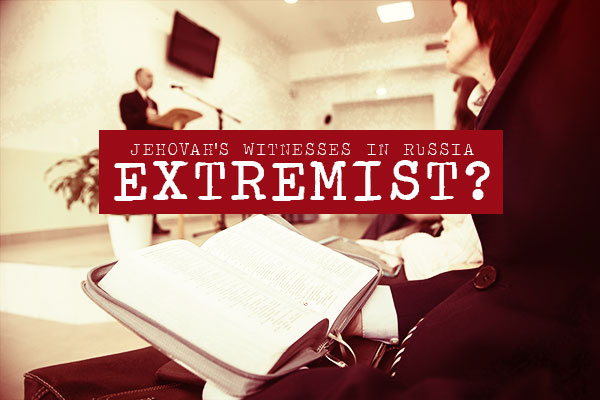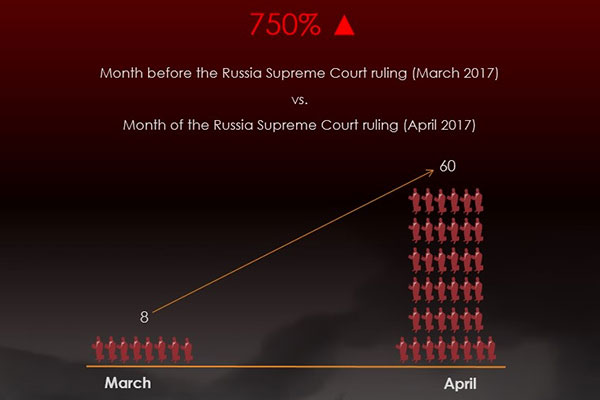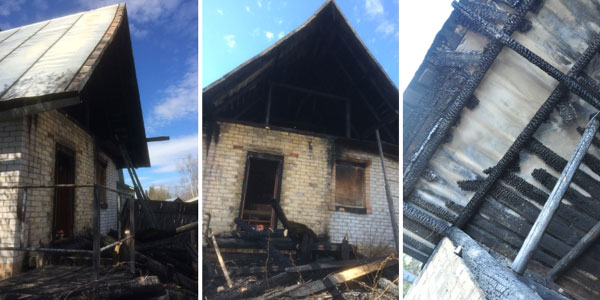
Exclusive Interview: Jehovah’s Witnesses Banned in Russia; Court Ruling Upheld Today
- By WRN Editorial Staff --
- 17 Jul 2017 --

Photo Courtesy of Jehovah’s Witnesses. Artwork by World Religion News.
After an April court ruling declaring Jehovah’s Witnesses extremists and a wave of violence against them, Russia has upheld a ban on the religion.
Jehovah’s Witnesses continue to be persecuted in Russia. This has occurred through laws, court decisions, and police actions. Russia has been designated a “country of particular concern” by the United States Commission on International Religious Freedom (USCIRF). It now ranks in the top 15 for religious persecution.
Exclusive Interview: Jehovah’s Witnesses Banned in Russia; Court Ruling Upheld Today[/tweetthis]
On April 20th, the Russian Supreme Court effectively banned the Jehovah’s Witness from any activity. Russia has banned a major religious organization for the first time.
Today, July 17, the Russian Supreme Court denied an appeal to the ban. Jehovah’s Witnesses cannot legally practice in Russia and all property must be turned over to the Russian government.


Last week, the Jehovah’s Witnesses issued a special report on violence against the group in the past three months. Since the Supreme Court ruling there has been an explosion to violence towards Jehovah’s Witnesses with a 750% increase in violence and 128 documented cases of mistreatment.
World Religion News was able to chat with Bryce Hemmelgarn, spokesman for the Jehovah’s Witnesses, about the recent wave of violence and the state of Jehovah’s Witnesses in Russia.
WRN: What is the history of Jehovah’s Witnesses in Russia?
BH: The persecution of Jehovah’s Witnesses goes back to the 1950s. There was intolerance to our teaching and door-to-door communication that lead to Witnesses being exiled to Siberia. Our religion was officially registered in 1991 and we were allowed practice without hindrance. There was a tightening up in the late 1990s with the judicial system cracking down on activity. In 2004 there was a ruling from the Supreme Court that resulted in our liquidation in Moscow, which was a big step in eliminating our rights. Since that time, we have seen an escalation of abuse on religious freedom.
WRN: Why were Jehovah’s Witnesses labeled an extremist group?
BH: There is no clear reason and it is baffling. We are known throughout the world for being peaceful and not forcing people to follow our faith. There are 170,000 Witnesses in Russia and while we speak to those about our beliefs and our view of the bible we have not acted with any violence and abhor it.
WRN: Who is committing the violence toward Jehovah’s Witnesses?
BH: It is hard to say. We have seen an arbitrary application of the laws in Russia. In some areas the local authorities may choose to allow Witnesses to continue their worship without hindrance, in others we have seen zealous arrests, detainment, and even violence by government forces. There is no pattern to the actions.
WRN: Is this wave of violence similar to what happened in the United States in the 1940s after the Gobities Case (over Jehovah’s Witnesses right to not salute the American flag in school, the Supreme Court ruled against them, leading to widespread attacks)
BH: It is the same in that decisions from the government influence local police, government, and local citizens. In the United States after the Gobitas decision, Witnesses were victims of violent community hostility. We do see similarities in Russia’s treatment of Jehovah’s Witnesses. These are situations where people adopt a fearful intolerant attitude because they don’t have enough knowledge and understanding of who we are and what we believe.
To be compared to extremists that use violence and aggression is offensive to us because Jehovah’s Witnesses are a positive influence in the communities they live in. We invite individuals to come and see how we worship. We try to combat this lack of understanding by letting our conduct speak for itself. We have posted video footage on our website, jw.org, of raids in the town of Orel by the Russian government. We encourage people to look at the contrast on how Jehovah’s Witnesses react in these situations. Witnesses sat peacefully and tried to cooperate with police forces and answered all questions. When the evidence is examined by an observer it is pretty clear that they try to be peaceful, even in the extreme situations they are in.
WRN: What kind of contact have you had with the Russian government? What is their response?
BH: Contact has been with embassies in other countries and making them aware of what Russia is attempting to do and exert pressure by making them aware. We have had limited contact with the Russian government. There have been sustained efforts.
WRN: What kind of contact have you had with other countries or international organization? What is their response?
BH: We have the attention of OSCEC and the Helsinki Commission. We have visited the embassies of countries where there are sizeable Russian populations and media outlets to increase awareness. We have seen some good results with public comments. Angela Merkel (Chancellor of Germany) has spoken out with specific reference the actions of Russian officials against Jehovah’s Witnesses. We have reached high levels.
WRN: Is there a fear that this could be modeled by other countries?
BH: There has been recent actions by Kazakhstan against Witnesses. We are concerned about former republics of the Soviet Union imitating Russia. Will they follow Russia? We do have a concern about this moving beyond Russia’s borders.
WRN: What is your plan at this stage?
BH: Since we lost the appeal with the Russian Supreme Court, we will now appeal with the European Court of Human Rights. There is little more we can do, besides showing tolerance and continue to peacefully meet people in any way in Russia. We continued our worship even after being sent to Siberia in the 1950s and we will continue.
WRN: What can individuals do to help?
BH: We do not try to lobby authorities in an attempt to affect legislation, we will continue to inform. Individuals that are interested in helping, please try to speak to a Witness that comes to your door. It is more of a gradual process that Witnesses educate their communities about our peaceful conduct.



















